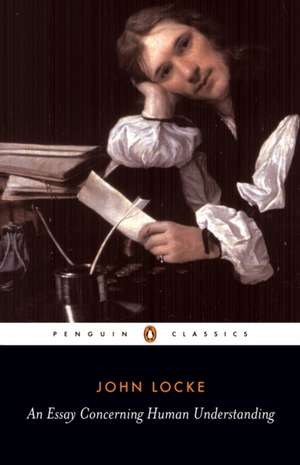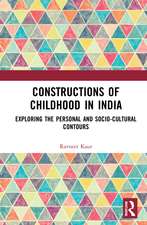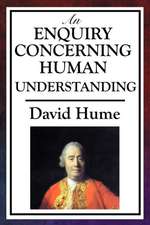An Essay Concerning Human Understanding
Autor John Locke Editat de Roger Woolhouseen Limba Engleză Paperback – 25 iun 1997
For more than seventy years, Penguin has been the leading publisher of classic literature in the English-speaking world. With more than 1,700 titles, Penguin Classics represents a global bookshelf of the best works throughout history and across genres and disciplines. Readers trust the series to provide authoritative texts enhanced by introductions and notes by distinguished scholars and contemporary authors, as well as up-to-date translations by award-winning translators.
| Toate formatele și edițiile | Preț | Express |
|---|---|---|
| Paperback (12) | 36.78 lei 3-5 săpt. | +22.99 lei 6-12 zile |
| WORDSWORTH EDITIONS LTD – 15 iun 2014 | 36.78 lei 3-5 săpt. | +22.99 lei 6-12 zile |
| Oxford University Press – 28 aug 2008 | 81.93 lei 11-16 zile | +32.23 lei 6-12 zile |
| Penguin Books – 25 iun 1997 | 82.91 lei 22-33 zile | +33.88 lei 6-12 zile |
| CREATESPACE – | 93.78 lei 3-5 săpt. | |
| Hackett Publishing Company – 15 sep 1996 | 98.56 lei 3-5 săpt. | +25.49 lei 6-12 zile |
| CREATESPACE – | 103.19 lei 3-5 săpt. | |
| CREATESPACE – | 131.67 lei 3-5 săpt. | |
| – | 172.66 lei 3-5 săpt. | |
| CREATESPACE – | 182.07 lei 3-5 săpt. | |
| Digireads.com – 14 iun 2019 | 164.56 lei 6-8 săpt. | |
| HardPress Publishing – 27 ian 2013 | 211.91 lei 39-44 zile | |
| Pomona Press – 31 dec 2006 | 215.32 lei 6-8 săpt. | |
| Hardback (1) | 291.87 lei 6-8 săpt. | |
| Pomona Press – 3 noi 2008 | 291.87 lei 6-8 săpt. |
Preț: 82.91 lei
Preț vechi: 96.98 lei
-15% Nou
Puncte Express: 124
Preț estimativ în valută:
15.87€ • 16.56$ • 13.31£
15.87€ • 16.56$ • 13.31£
Carte disponibilă
Livrare economică 21 februarie-04 martie
Livrare express 05-11 februarie pentru 43.87 lei
Preluare comenzi: 021 569.72.76
Specificații
ISBN-13: 9780140434828
ISBN-10: 0140434828
Pagini: 816
Dimensiuni: 129 x 198 x 34 mm
Greutate: 0.48 kg
Ediția:Revizuită
Editura: Penguin Books
Colecția Penguin Classics
Locul publicării:London, United Kingdom
ISBN-10: 0140434828
Pagini: 816
Dimensiuni: 129 x 198 x 34 mm
Greutate: 0.48 kg
Ediția:Revizuită
Editura: Penguin Books
Colecția Penguin Classics
Locul publicării:London, United Kingdom
Notă biografică
John
Locke
(1632-1704)
was
educated
at
Christ
Church,
Oxford
and
held
various
academic
posts
at
that
university,
lecturing
on
Greek
and
rhetoric.
However,
his
interests
lay
in
medicine
and
the
new
experimental
sciences
and
in
1667
he
became
personal
physician
to
the
Earl
of
Shaftesbury.
Under
the
influence
of
Shaftesbury,
Locke
developed
his
ideas
on
politics,
property,
trade,
monarchy
and
the
mind.
Shaftesbury
became
a
bitter
opponent
of
Charles
II
and
was
involved
in
the
plot
of
1683.
This
forced
Locke
to
flee
in
exile
to
Holland,
but
he
returned
after
1688
and
began
to
publish
his
most
famous
works.
He
wrote
also
on
tehology,
education,
and
in
defence
of
religous
tolerance,
while
founding
the
analytic
philosophy
of
the
mind.
Roger Woolhouse is Professor of Philosophy at the University of York. He has also edited George Berkeley's Principles of Human Knowledge and Three Dialogues Between Hylas and Philonous for Penguin Classics.
Roger Woolhouse is Professor of Philosophy at the University of York. He has also edited George Berkeley's Principles of Human Knowledge and Three Dialogues Between Hylas and Philonous for Penguin Classics.
Cuprins
Introduction
Further Reading
Bibliographical Abbreviations
A Note on the Text
Title-page of the Fifth Edition
AN ESSAY CONCERNING HUMAN UNDERSTANDING
The Epistle Dedicatory
The Epistle to the Reader
The Contents
Book I: Of Innate Notions
I Introduction
II No Innate Principles in the Mind
III No Innate Practical Principles
IV Other Considerations concerning Innate Principles, both Speculative and Practical
Book II: Of Innate Notions
I Of Ideas in General, and their Original
II Of Simple Ideas
III Of Ideas of One Sense
IV Of Solidity
V Of Simple Ideas of Divers Senses
VI Of Simple Ideas of Reflection
VII Of Simple Ideas of both Sensation and Reflection
VIII Some further Considerations concerning our Simple Ideas
IX Of Perception
X Of Retention
XI Of Discerning, and other Operations of the Mind
XII Of Complex Ideas
XIII Of Simple Modes; and first, of the Simple Modes of Space
XIV Of Duration, and its Simple Modes
XV Of Duration and Expansion, considered together
XVI Of Number
XVII Of Infinity
XVIII Of other Simple Modes
XIX Of the Modes of Thinking
XX Of Modes of Pleasure and Pain
XXI Of Power
XXII Of Mixed Modes
XXIII Of our Complex Ideas of Substances
XXIV Of Collective Ideas of Substances
XXV Of Relation
XXVI Of Cause and Effect, and other Relations
XXVII Of Identity and Diversity
XXVIII Of other Relations
XXIX Of Clear and Obscure, Distinct and Confused Ideas
XXX Of Real and Fantastical Ideas
XXXI Of Adequate and Inadequate Ideas
XXXII Of True and False Ideas
XXXIII Of the Association of Ideas
Book III: Of Words
I Of Words or Language in General
II Of the Signification of Words
III Of General Terms
IV Of the Names of Simple Ideas
V Of the Names of Mixed Modes and Relations
VI Of the Names of Substances
VII Of Particles
VIII Of Abstract and Concrete Terms
IX Of the Imperfection of Words
X Of the Abuse of Words
XI Of the Remedies of the Foregoing Imperfections and Abuses
Book IV: Of Knowledge and Opinion
I Of Knowledge in General
II Of the Degrees of Our Knowledge
III Of the Extent of Human Knowledge
IV Of the Reality of Knowledge
V Of Truth in General
VI Of Universal Propositions, their Truth and Certainty
VII Of Maxims
VIII Of Trifling Propositions
IX Of our Knowledge of Existence
X Of our Knowledge of the Existence of a God
XI Of our Knowledge of the Existence of Things
XII Of the Improvement of our Knowledge
XIII Some further Considerations concerning our Knowledge
XIV Of Judgment
Xv Of Probability
XVI Of the Degrees of Assent
XVII Of Reason
XVIII Of Faith and Reason, and their Distinct Provinces
XIX Of Enthusiasm
XX Of Wrong Assent, or Error
XXI Of the Division of the Sciences
Further Reading
Bibliographical Abbreviations
A Note on the Text
Title-page of the Fifth Edition
AN ESSAY CONCERNING HUMAN UNDERSTANDING
The Epistle Dedicatory
The Epistle to the Reader
The Contents
Book I: Of Innate Notions
I Introduction
II No Innate Principles in the Mind
III No Innate Practical Principles
IV Other Considerations concerning Innate Principles, both Speculative and Practical
Book II: Of Innate Notions
I Of Ideas in General, and their Original
II Of Simple Ideas
III Of Ideas of One Sense
IV Of Solidity
V Of Simple Ideas of Divers Senses
VI Of Simple Ideas of Reflection
VII Of Simple Ideas of both Sensation and Reflection
VIII Some further Considerations concerning our Simple Ideas
IX Of Perception
X Of Retention
XI Of Discerning, and other Operations of the Mind
XII Of Complex Ideas
XIII Of Simple Modes; and first, of the Simple Modes of Space
XIV Of Duration, and its Simple Modes
XV Of Duration and Expansion, considered together
XVI Of Number
XVII Of Infinity
XVIII Of other Simple Modes
XIX Of the Modes of Thinking
XX Of Modes of Pleasure and Pain
XXI Of Power
XXII Of Mixed Modes
XXIII Of our Complex Ideas of Substances
XXIV Of Collective Ideas of Substances
XXV Of Relation
XXVI Of Cause and Effect, and other Relations
XXVII Of Identity and Diversity
XXVIII Of other Relations
XXIX Of Clear and Obscure, Distinct and Confused Ideas
XXX Of Real and Fantastical Ideas
XXXI Of Adequate and Inadequate Ideas
XXXII Of True and False Ideas
XXXIII Of the Association of Ideas
Book III: Of Words
I Of Words or Language in General
II Of the Signification of Words
III Of General Terms
IV Of the Names of Simple Ideas
V Of the Names of Mixed Modes and Relations
VI Of the Names of Substances
VII Of Particles
VIII Of Abstract and Concrete Terms
IX Of the Imperfection of Words
X Of the Abuse of Words
XI Of the Remedies of the Foregoing Imperfections and Abuses
Book IV: Of Knowledge and Opinion
I Of Knowledge in General
II Of the Degrees of Our Knowledge
III Of the Extent of Human Knowledge
IV Of the Reality of Knowledge
V Of Truth in General
VI Of Universal Propositions, their Truth and Certainty
VII Of Maxims
VIII Of Trifling Propositions
IX Of our Knowledge of Existence
X Of our Knowledge of the Existence of a God
XI Of our Knowledge of the Existence of Things
XII Of the Improvement of our Knowledge
XIII Some further Considerations concerning our Knowledge
XIV Of Judgment
Xv Of Probability
XVI Of the Degrees of Assent
XVII Of Reason
XVIII Of Faith and Reason, and their Distinct Provinces
XIX Of Enthusiasm
XX Of Wrong Assent, or Error
XXI Of the Division of the Sciences
Appendix:
John Locke's Debate with Edward Stillingfleet, Bishop of Worcester, as it figures in footnotes in the Fifth Edition of the Essay
Index to the Fifth Edition
Notes
Descriere
Provides an account of how we acquire everyday, mathematical, natural scientific, religious and ethical knowledge. Rejecting the theory that some knowledge is innate in us, this title argues that it derives from sense perceptions and experience, as analysed and developed by reason.

















